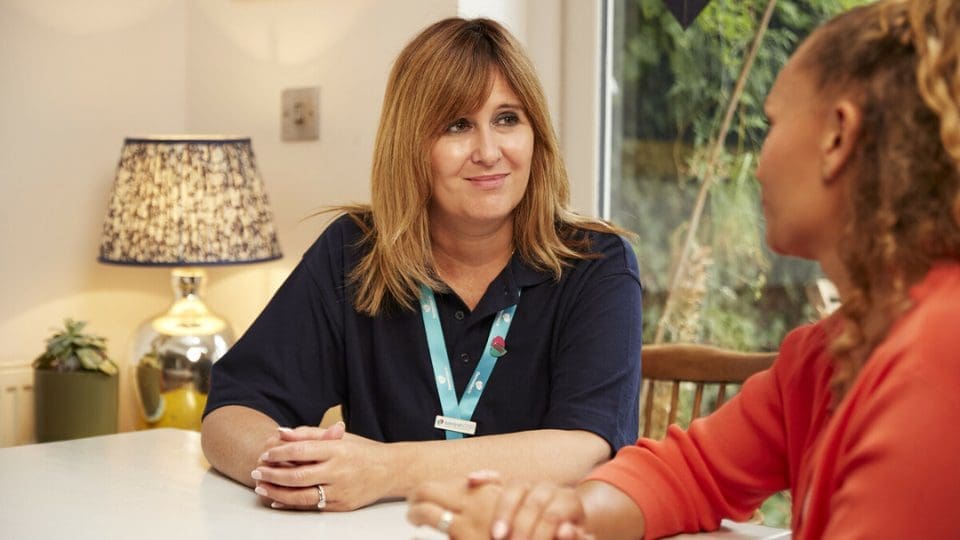Looking after yourself as a carer of someone with dementia
Dementia can have a significant impact on a person’s daily life, including how well they function within their home and their co-ordination.
Steve’s wife, Julie, was diagnosed with young onset Alzheimer’s seven years ago. He talks about how he has coped with the condition with his own brand of pragmatism, and the empowerment he’s received from his Admiral Nurse, Amy.
Julie and I have been together for 30 years. We had hopes and dreams just like any couple; we were talking about retirement plans when we were in our mid-50s which included getting somewhere down by the coast to relax, and looking after our beloved grandchildren. This is one of the reasons why the diagnosis of young onset Alzheimer’s came as such a shock – Julie was 52 and I was 58. We realized at that point that the future was going to be nothing like what we had planned for.
However, I can still find strength from our relationship. I often ask myself: ‘What would Julie do if the tables were turned?’ I’m feeling my way through the challenges that the illness presents, using common sense and doing my best, though it’s not always easy to know what is best.
I would like to share the philosophies which have guided me in my role as a carer, in the hope that they are of benefit to other family carers going through a similar position.
Julie was a very clever and well-educated woman who understood what it all meant when the diagnosis was explained to her. My role as a carer kicked in straight away; anything that would happen to her would happen to me as well – I told her this with all the reassurance I could give as her loving husband.
With such challenging news, it was helpful to me to use the game of cards analogy. I collect a hand I think I’m playing and then all of a sudden those cards are ripped from me and I’m dealt a new hand. I don’t really have any choice but to play that hand. I can rue the day I lost the hand I thought I had, but that’s a waste of time, and negative thoughts just undermine your efforts. The only thing I can do is to make the best of what I have. If I take that as a starting point, it’s an empowering way to feel.
In the early stages, my wife was feeling shocked, desperate, even angry and confused. Those feelings were difficult to deal with, particularly as we were only two people living together so her anger could only be directed at me – it wasn’t personal though. I realised that my wife was entitled to be angry, given how the Alzheimer’s was changing what she thought she knew. At times I needed to stand back or to count to 10, but both of these strategies made it easier to see it from her point of view.
I remind myself that she is still the same person inside.
She no longer has the rational thoughts or communication skills to reach out for help, but I can be there for her when she’s low as well as when she’s contented.
Now that my wife is at the severe stage of the condition, where she is prone to psychosis, loss of communication and marked confusion, a different philosophy applies. I like to think of it in terms of living in the here and now. If I start with an agenda, I know I’ll be disappointed because there will be some curveballs coming in the day. After all, days rarely turn out the way I expect them to. I need to be ready to cope with exactly what I have to do that day, not what I thought I would be doing.
There are some things I do to raise both of our spirits, and looking for common points of interest is really important. I keep trying to communicate, but especially communicating on her level as things change. Music has been great for Julie in this respect. I have playlists on Spotify of all the songs she’s ever loved, with different playlists for different moods. I put them on in the background and I know that for certain songs she’ll get up to dance; she’ll often be laughing her head off when she does this. I get my happiness knowing that Julie is living the best quality of life she can, or thinking she’s living the best quality of life she can. The warmth and happiness it brings in her is amazing.
Meeting my Admiral Nurse, Amy, through our doctor has been a breath of fresh air. She’s a great listener and I can bounce my ideas to care for Julie off her.
Her input is invaluable because I’m now at the coalface where I have to do everything for Julie. This is a whole different type of caring than just reassuring someone. I’ve only got experience of dementia up to the stage I’m at with Julie. As Amy has seen many people with the condition, she understands what the long-term implications of caring can be, and how I may need to be signposted to support services like carers’ groups in the future.
She has empowered me to be the best carer I can be for my wife, whether that’s gently guiding me down the most appropriate option or reinforcing a decision I have already come to. Without Amy, coping would be a much greater challenge – I am so grateful.
Dementia can have a significant impact on a person’s daily life, including how well they function within their home and their co-ordination.

An Admiral Nurse is a dementia specialist nurse that provides life-changing care for families affected by all forms of dementia.